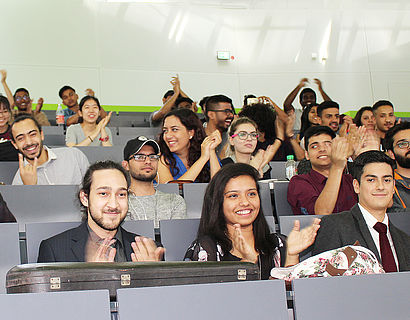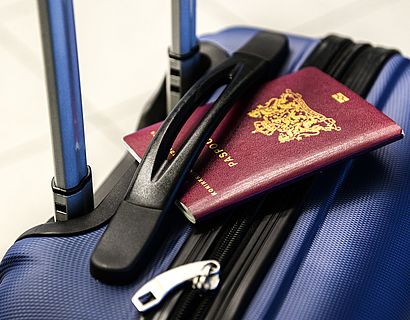Key facts
|
Degree |
Master of Engineering (M.Eng.) |
|---|---|
|
Language of instruction |
German |
|
Modes of study |
full-time |
|
Standard duration |
3 semsters |
|
Programme start |
summer semester |
|
Fees |
no tuition fees (the university only charges semester fees each semester) |
|
Application deadlines |
|
|
Faculty |
Study objectives
Automation technology is a cross-sectional technology used in almost all technical fields, including energy technology, medical and automotive engineering, traffic management, mechanical engineering, plant construction and aerospace. The specialist and leadership positions that are required in these fields are open not only to those with a bachelor’s degree, but also to graduates with a master’s degree for work in higher leadership positions and in positions with project responsibility - specifically in the application of automation technology in the field of modern energy management.
The aim of this degree programme is to prepare graduates for a demanding, modern and sustainable career and to give them the specialist and leadership skills to do this at the master’s level. Independence, holistic thinking in technical and business contexts, teamwork abilities and social skills play a key role here. Graduates will master the ability to optimally design decentralised, automated energy systems. Graduates will be a primary point of contact for dimensioning, maintaining and evaluating the performance of energy systems used in industrial production and commercial application, particularly in the branches: Regenerative energy technology, speciality mechanical engineering (automotive, pharmaceutical, etc.) and machine tool building.
Course contents
- Project work
- In-depth study of the systematic areas of automation technology and physics engineering / energy systems
- Application of systems for energy generation, storage and management
- Management methods for solving complex analysis and decision-making tasks.
- Master’s thesis
Programme modulesOpen areaClose area
- AES-Project
- Power Generation Systems
- Database Systems
- Advanced Closed-loop Control Systems
- Process Control Systems
- System Dynamics and Simulation
- Energy Storage Systems
- Energy Management/ Consultancy
- Design of Experiments
- Environmental and Quality Management
- Business and Technology Management
- Investment Planning
- Controlling/ Accounting
- Business Law
- Non-technical Module (from other Master-Study Programs)
Career opportunitiesOpen areaClose area
Graduates of this master’s degree programme will master the ability to optimally design decentralised, automated energy systems. Graduates will be a primary point of contact for dimensioning, maintaining and evaluating the performance of energy systems used in industrial production and commercial application, particularly in the branches:
- Regenerative energy technology
- Speciality mechanical engineering (automotive, pharmaceutical)
- Machine tool building
Admission requirements and applicationOpen areaClose area
General admission requirements
Specific admission requirements
A professional first degree comprising at least 210 credit points (CP).
(1) Applicants holding a degree comprising 180 CP and who meet the requirements of paragraphs 4 and 5, may take a certification module according to article 4, paragraph 7, page 7 of the University Examination Regulations at TH Wildau that is worth a total of 30 CP. This certification module comprises an automation project worth 10 CP that will be defined by the degree programme director and marked by a university lecturer as well as four set supporting courses each worth 5 CP. This automation project must be clearly defined and deal with a topic in the area of automation technology. The results of the project are presented in written documentation of approx. 30 pages in length. The project documentation serves as the examination material for the certification module and will be assessed as ‘successful’/’unsuccessful’. The assessment criteria for the project documentation are as follows: content quality, consistency and structure of arguments, the technical documentation, reflection on the results of the project as well as experience gained and conclusions drawn. Courses on “Control Technology”, “Visualisation”, “Computer-Aided System Analysis” and “Specialist English” must be completed. Successful completion of the certification module will be based on successful completion of the examinations for these courses and will be assessed as ‘successful’/’unsuccessful’. The 30 CP from the certification module must be presented before starting the master’s degree programme.
(2) Applicants according to (2) may apply to be provisionally admitted to the degree programme whilst working on the certification module.
(3) Applicants must demonstrate that they hold a relevant specialist qualification upon submission of their application along with their first relevant university degree. Completion of a degree programme in Automation Technology, Physics Engineering / Energy Systems, Mechanical Engineering, Engineering or Telematics is considered as a sufficient specialist qualification.
(4) Applicants from other degree programmes must have studied a degree covering closely related subject areas. This may be demonstrated by skills in the following areas: Control technology, electronics, control engineering, system analysis and automation systems. In case of any doubt, the final decision rests with the faculty Examinations Board.
(5) In accordance with the Regulations of the TH Wildau for the selection of students for degree programmes with restricted admission criteria, a motivation letter written in English will also be required as an admission requirement (in the case of this degree programme), in which the applicant describes his/her motivation for the selected degree programme or why it appeals so strongly over a minimum of two pages and a maximum of three pages. This motivation letter must be submitted on time with the other application documentation.
Language skills: To be admitted to this degree programme, overseas applicants must possess sufficient German language skills. This may be demonstrated with an overall grade of DSH-2 or better from the Deutsche Sprachprüfung für Hochschulen (DSH) language exam.
Application
You can apply to TH Wildau online. All the information you need to apply can be found on our central application page.




